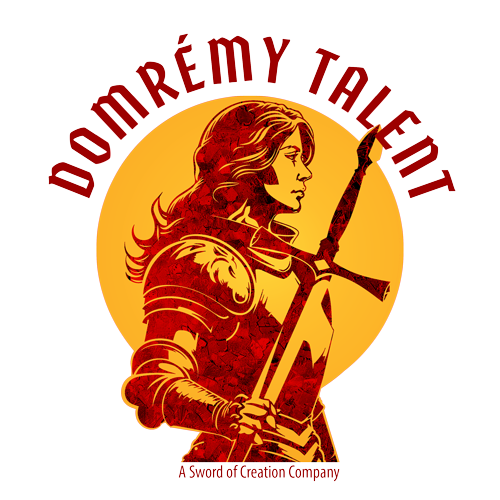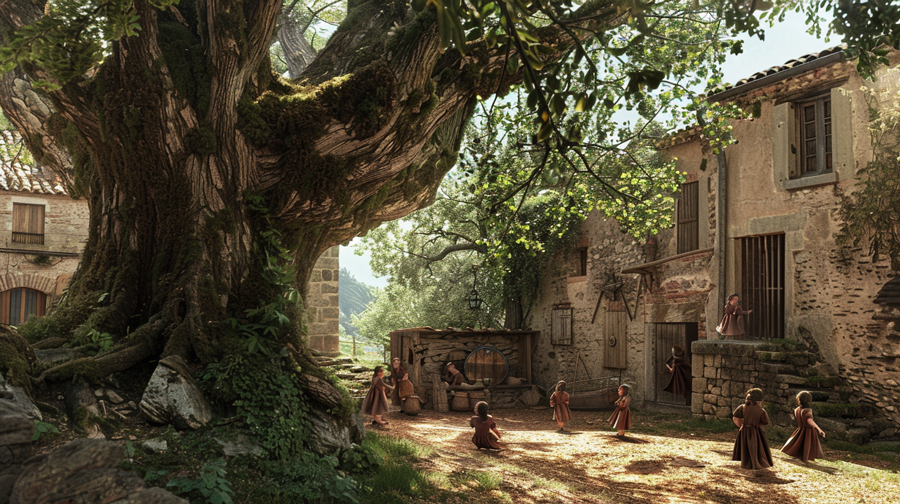“God and the King.” “Not Satan?” “Satan, my child? This is the footstool of the Most High—Satan owns no handful of its soil.” “Then who gave those poor creatures their home? God. Who protected them in it all those centuries? God. Who allowed them to dance and play there all those centuries and found no fault with it? God. Who disapproved of God’s approval and put a threat upon them? A man. Who caught them again in harmless sports that God allowed and a man forbade, and carried out that threat, and drove the poor things away from the home the good God gave them in His mercy and His pity, and sent down His rain and dew and sunshine upon it five hundred years in token of His peace? It was their home—theirs, by the grace of God and His good heart, and no man had a right to rob them of it. And they were the gentlest, truest friends that children ever had, and did them sweet and loving service all these five long centuries, and never any hurt or harm; and the children loved them, and now they mourn for them, and there is no healing for their grief. And what had the children done that they should suffer this cruel stroke? The poor fairies could have been dangerous company for the children? Yes, but never had been; and could is no argument. Kinsmen of the Fiend? What of it? Kinsmen of the Fiend have rights, and these had; and children have rights, and these had; and if I had been there I would have spoken—I would have begged for the children and the fiends, and stayed your hand and saved them all. But now—oh, now, all is lost; everything is lost, and there is no help more!” Then she finished with a blast at that idea that fairy kinsmen of the Fiend ought to be shunned and denied human sympathy and friendship because salvation was barred against them. She said that for that very reason people ought to pity them, and do every humane and loving thing they could to make them forget the hard fate that had been put upon them by accident of birth and no fault of their own. “Poor little creatures!” she said. “What can a person’s heart be made of that can pity a Christian’s child and yet can’t pity a devil’s child, that a thousand times more needs it!” She had torn loose from Pere Fronte, and was crying, with her knuckles in her eyes, and stamping her small feet in a fury; and now she burst out of the place and was gone before we could gather our senses together out of this storm of words and this whirlwind of passion. The Pere had got upon his feet, toward the last, and now he stood there passing his hand back and forth across his forehead like a person who is dazed and troubled; then he turned and wandered toward the door of his little workroom, and as he passed through it I heard him murmur sorrowfully: “Ah, me, poor children, poor fiends, they have rights, and she said true—I never thought of that. God forgive me, I am to blame.” When I heard that, I knew I was right in the thought that he had set a trap for himself. It was so, and he had walked into it, you see. I seemed to feel encouraged, and wondered if mayhap I might get him into one; but upon reflection my heart went down, for this was not my gift.
Then he brushed the ashes out of her hair, and helped her scour her face and neck and properly tidy herself up. He was in fine spirits now, and ready for further argument, so he took his seat and drew Joan to his side again, and said: “Joan, you were used to make wreaths there at the Fairy Tree with the other children; is it not so?” That was the way he always started out when he was going to corner me up and catch me in something—just that gentle, indifferent way that fools a person so, and leads him into the trap, he never noticing which way he is traveling until he is in and the door shut on him. He enjoyed that. I knew he was going to drop corn along in front of Joan now. Joan answered: “Yes, father.” “Did you hang them on the tree?” “No, father.” “Didn’t hang them there?” “No.” “Why didn’t you?” “I—well, I didn’t wish to.” “Didn’t wish to?” “No, father.” “What did you do with them?” “I hung them in the church.” “Why didn’t you want to hang them in the tree?” “Because it was said that the fairies were of kin to the Fiend, and that it was sinful to show them honor.” “Did you believe it was wrong to honor them so?” “Yes. I thought it must be wrong.” “Then if it was wrong to honor them in that way, and if they were of kin to the Fiend, they could be dangerous company for you and the other children, couldn’t they?” “I suppose so—yes, I think so.” He studied a minute, and I judged he was going to spring his trap, and he did. He said: “Then the matter stands like this. They were banned creatures, of fearful origin; they could be dangerous company for the children. Now give me a rational reason, dear, if you can think of any, why you call it a wrong to drive them into banishment, and why you would have saved them from it. In a word, what loss have you suffered by it?” How stupid of him to go and throw his case away like that! I could have boxed his ears for vexation if he had been a boy. He was going along all right until he ruined everything by winding up in that foolish and fatal way. What had she lost by it! Was he never going to find out what kind of a child Joan of Arc was? Was he never going to learn that things which merely concerned her own gain or loss she cared nothing about? Could he never get the simple fact into his head that the sure way and the only way to rouse her up and set her on fire was to show her where some other person was going to suffer wrong or hurt or loss? Why, he had gone and set a trap for himself—that was all he had accomplished. The minute those words were out of his mouth her temper was up, the indignant tears rose in her eyes, and she burst out on him with an energy and passion which astonished him, but didn’t astonish me, for I knew he had fired a mine when he touched off his ill-chosen climax. “Oh, father, how can you talk like that? Who owns France?”

